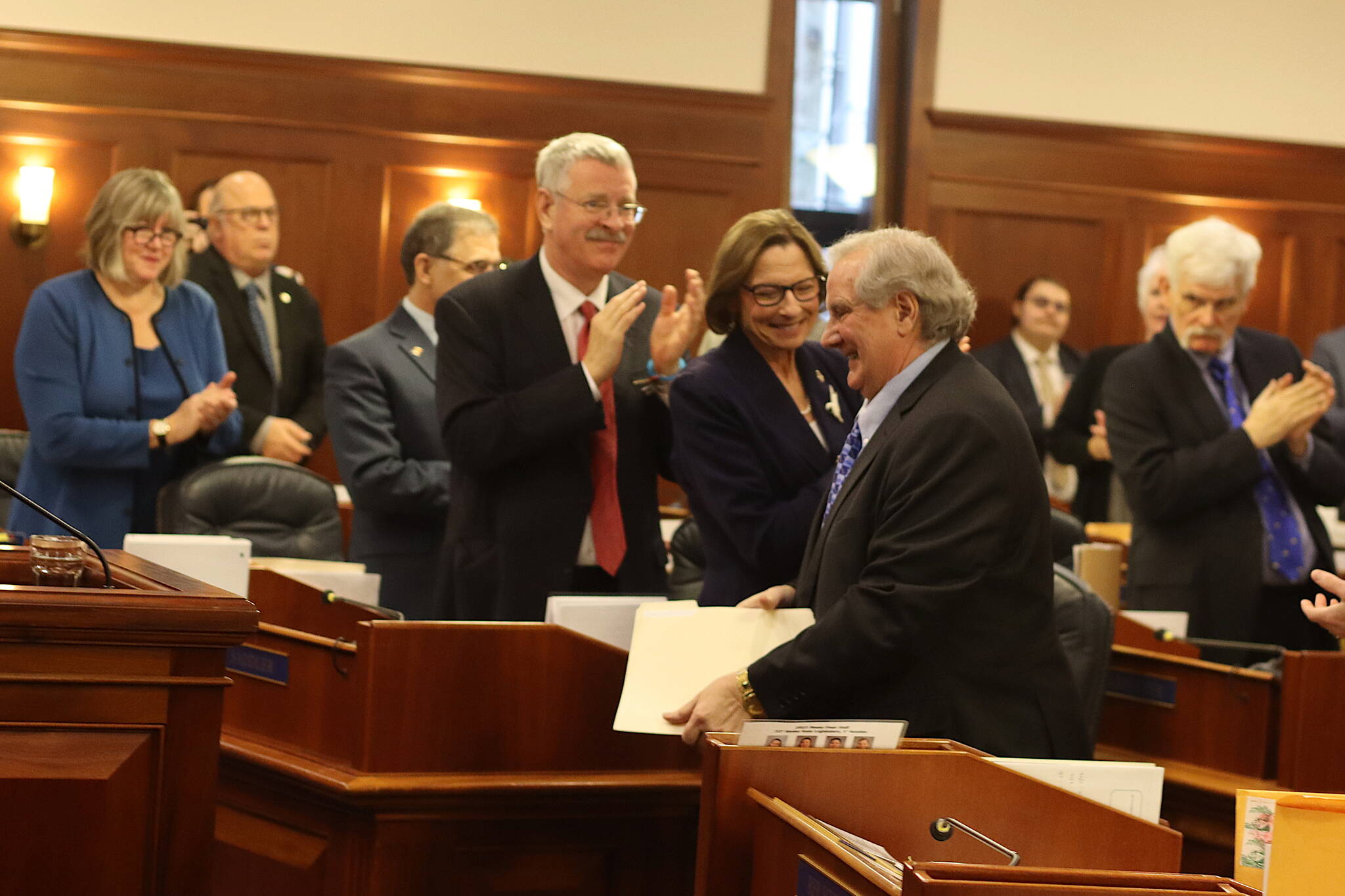An aggressive and colorful defense of a non-politicized court system was delivered by Daniel Winfree, chief justice of the Alaska Supreme Court, in his State of the Judiciary speech Wednesday to the Alaska State Legislature just five days before his age-mandated retirement.
The 40-minute speech began with an overview of the court’s efforts to catch up on the backlog of cases resulting from the COVID-19 pandemic. But Winfree, appointed to the court in 2008 and chief justice since 2021, spent the latter portion discussing the differences between the branches of government and the respect between them that should exist — but sometimes doesn’t.
“I realize some here don’t believe in an independent judiciary, but it should be hand-picked by politicians so they render decisions the politicians want,” he said.
Winfree, who turns 70 next Monday, reiterated the state constitution’s defined role for the judicial branch as independently minded and unaffected by attempts at political influence, while acknowledging he was speaking to some skeptics in the legislative audience.
“Some of you are thinking ‘what a crock — of course politics comes into play and we’re just activist judges,’” he said. “But I believe that’s because some of you see everything through a political lens.”
An activist judge, Winfree said, is in his experience “a judge who rules against you.”
“When they like the result we’re incredibly smart, wonderful or at least the blind pig who could find the truffle,” he said.
The chief justice told the lawmakers “it may surprise you to hear I admire you…I couldn’t do what you do. It’s not my makeup.” He said that comes from recognizing “our three branches of government have separate duties, but common ground.”
“That’s why when I see you through my judiciary lens I don’t understand what you’re doing and why you’re doing it,” he said. “But that’s when I remember you don’t see what we’re doing through a judicial lens.”
Winfree, in an interview after his speech, said he doesn’t know if he’s hearing more complaints about activist judges, but “it’s been louder.” So while he wanted to offer a fond farewell and assessment of Alaska’s judiciary process as it exists, he also wanted to sound a note of caution.
“I thought as I was stepping out of the building it was something I should say,” he said.
Reaction from many of the lawmakers and others listening to speech was largely laudatory.
”That was the finest speech I think I have ever heard from a chief justice,” said Senate President Gary Stevens, a Kodiak Republican who has been in the Legislature since 2001. “It was personable, it was full of life.”
A handful of legislators have sought recent changes to the process of selecting judicial nominees. The governor currently appoints justices from lists of candidates submitted by the Alaska Judicial Council, an independent seven-member board composed of at least three lawyers and at least three non-lawyers from various parts of the state, plus the chief justice who chairs the council.
Altering the process of selecting justices would mean altering the state Constitution, said Sen. Cathy Giessel, an Anchorage Republican.
“Seventy percent of Alaskans said no to that just a few months ago,” she said, referring to the landslide vote rejecting a state constitutional convention, “so, no, I don’t believe we’re going to change that process.”
Among those in the packed audience sections of the House chambers for Winfree’s speech were the other four state Supreme Court justices, including Peter Maassen who will be the next chief justice, as well as Jude Pate of Sitka who has been nominated by Gov. Mike Dunleavy to fill the vacancy on the court after Winfree’s departure.
Winfree opened his speech by joking that while he’s about to be too old to be chief justice he’s apparently “not old enough to be president of the United States” given the current leading contenders in both major parties are notably older than him. From there he pivoted to introducing the other justices and key members of the court’s staff, before beginning the substance of his address on a positive note by stating the number of cases heard in 2022 was about the same as 2019.
“That means we are in full recovery, so to speak, from the pandemic and things are happening as they were before the pandemic,” he said.
Unfortunately, there is still a considerable and larger-than-expected backlog of cases, Winfree said. That’s because many of the roughly 97% of cases that don’t go to trial went unheard during the pandemic, and trying to catch up has been hampered by a shortage of staffing and other issues.
“The number of pending criminal cases remains higher than normal as result of pandemic disruptions and subsequent events, which is frustrating given the progress made to deal with this before the pandemic,” he said.
Expansion efforts are in the works, including reopening courts to the public on Friday afternoons after they were closed several years ago for budget reasons, as well as installing equipment in jails and other facilities so more remote hearings are possible. The latter, he said, will reduce security risks and “this should result in significant cost savings as well.”
Another recent technology boost has been public live streaming of high-profile cases, which in one recent trial has more than 100 people listening online, Winfree said.
The departing chief justice said in his interview afterward the pandemic is the most significant occurrence he can remember during his career, since even the 1964 Anchorage earthquake didn’t result in the shutdown of the courts system. As for what he didn’t know coming in as chief justice that he passed on to his successor, he cited being a manager as well as a magistrate.
“You don’t recognize you’re also a five-member board of directors running a branch of government,” he said.
• Contact reporter Mark Sabbatini at mark.sabbatini@juneauempire.com

